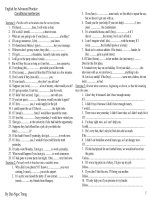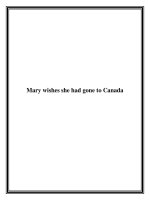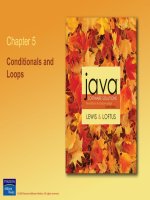CONDITIONALS WISHES
Bạn đang xem bản rút gọn của tài liệu. Xem và tải ngay bản đầy đủ của tài liệu tại đây (112.62 KB, 5 trang )
IG: phuc.gol
CONDITIONALS
A Conditional Sentence has two parts: IF Clause and Main Clause.
Examples: If I were a bird, I would be a white pigeon.
If he comes, tell him to wait for me.
Had you done as I told you, I think you would’ve succeeded.
A. POSSIBLE CONDITION IN THE PRESENT/ FUTURE
IF Clause
Main Clause
S + V0/s/es
S + V0/s/es
(Please) (Don’t) V0
S + will/ shall/ can/ may/ etc. + V0
Examples
If you are right, I am wrong.
If you heat water, it boils.
If you press the switch, the computer
comes on.
If you meet Henry, please ask him why
he’s absent today.
If you see Cheryl, don’t tell her
anything.
I may call you tonight if I have time.
If you don’t apologize, I’ll never speak
to you again.
B. IMPOSSIBLE CONDITION IN THE PRESENT/ FUTURE
IF Clause
S + Ved/2
S + were
Main Clause
S + would/ could/ might/ etc. + V0
Examples
If I were a flower, I would be a
sunflower.
If it weren’t raining, I might work in the
garden now.
Rachel wouldn’t always be late if she
got up earlier.
C. IMPOSSIBLE CONDITION IN THE PAST
IF Clause
Past Perfect
Main Clause
S + would/ could/ might/ etc. +
have + V3/ed
Examples
If I had taken his advice at that time,
I’d have had great success.
I could’ve contacted you if I’d had my
mobile yesterday.
If he hadn’t wasted too much time, he
wouldn’t have failed in his
examination.
D. MIXED CONDITIONALS
Definition
We use a mixed conditional to show a past
event has an effect on the present. The IF
Clause refers to the past (third conditional)
and the Main Clause refers to the present
or future (second conditional)
Examples
If Brahms hadn’t broken his leg since
yesterday, he would be able to play football
now.
I would be sitting in a comfortable office now
if I’d worked harder at school.
E. SOME REVALENT FORMS
Forms
UNLESS = IF…NOT
Meaning
Trừ phi, nếu…không
PROVIDED/ PROVIDING
(THAT)
AS LONG AS
Chiefly used with
permission (miễn là)
Chỉ cần, với điều kiện,
chừng nào mà, miễn là
Với điều kiện là
ON CONDITION THAT
IN CASE
IN CASE OF + N
= IF THERE IS A/ AN + N
SUPPOSE/ SUPPOSING
(THAT) = WHAT IF
We use in case when
we are thinking about
something might
happen. (phòng khi)
An in case clause is
normally placed after
the main clause.
Examples
I will go for a walk unless it rains. =
I will go for a walk if it doesn’t rain.
Warning:
We don’t use unless for impossible
conditions.
You can camp here provided you
leave no mess.
I’ll lend you my car as long as you
bring it back tonight.
You will be paid tomorrow on
condition that the work is finished.
I’m going to buy a sandwich in case
I get hungry later.
I always slept on the phone in case
he rang during the night.
In case of accident, phone 999. = If
there is an accident, phone 999.
Suppose the plane is late? = What
(will happen) if the plane is late?
“What if, what if we start to drive?
What if, what if we close our eyes?
What if we’re speeding through red
lights into paradise?” (Youth - Troy
Sivan)
Warning:
* Suppose is also used to give
suggestion: Suppose you ask him =
Why don’t you ask him?
* Proverb: What if I am? Tao thế thì
đã sao nào? (mang tính thách thức)
Forms
IF ≠ WHEN
Meaning
WHEN is used when
the speaker knows
something for sure.
IF is used when the
speaker is not sure
about something.
BUT FOR + N
IF IT WERE NOT FOR + N
Nếu không có
IF IT HAD NOT BEEN FOR
+N
Cho dù
EVEN IF
Examples
When Robert’s parents come home,
they will take him out for a meal.
If Robert’s parents are at home, there
won’t be a party.
If you hadn’t helped us, we would
have been in trouble. = But for your
help, we would have been in trouble.
But for the difficult view, that would
be a lovely room. = If it weren’t for
the difficult view, that would be a
lovely room.
But for the rain, they would have
had a good picnic. = If it hadn’t
rained, they would have had a good
picnic.
I still may not forgive you even if
you apologize,
Even if you take a taxi, you’ll still
miss your train.
NOTES
When IF Clause comes at the beginning
of the sentence, we put a comma after it.
Inversion is used in conditional sentences
where if is replaced by had, were and
should.
If Andrew had worked harder, he would’ve
passed your final exam.
Should he remember his own name, we’ll be able
to help him. = If he remembers his own name, …
Should you not wish to join them, you must let
them know before 4 o’clock. = If you don’t wish
to join them, …
Were we to have kids, we would need a bigger
house. = If we had kids, …
Were there not the COVID-19 outbreak, they
could have gone to Wuhan for their holiday. = If
there weren’t the COVID-19 outbreak, …
Were it not for the money, this job wouldn’t be
worthwhile. = If it weren’t for the money, …
Had I known you were waiting outside, I would
have invited you to come in. (If I had known you
were waiting outside, …)
Had it not rained yesterday, we would have
finished painting the walls. = If it hadn’t rained
yesterday, …
Present Tense is used in IF Clause instead
of will, shall to refer to Future.
But: Will can be used in IF Clause with
the meaning of willingness, insistence & a
result of the action of the Main Clause.
Present Subjunctive is used in IF Clause
to emphasize an uncertainty.
If it doesn’t rain tomorrow, I’ll go on a trip.
If you will sell your car, I’ll buy it. (willingness)
= If you are willing to sell your car, …
If you will get drunk every night, you’ll come
down with headache. (Insistence)
If it will make you happier, I’ll give up smoking.
(the result of the action)
If anyone should call, please let me know.
If the news be true, we may get much trouble.
WISHES
Wish + to-infinitive
When we use wish followed by a verb in
the to-infinitive form, wish means the same
as want, but it is more formal. We do not
normally use wish in the continuous form
when we use it with a to-infinitive:
We don’t use a that-clause after wish when
it is a more formal version of want:
We can use an object (underlined), before
the to-infinitive:
When we use an object after wish, we must
also use a verb in the to-infinitive form.
Alternatively, we can say want or (more
politely) would like:
I wish to speak to Mr. Hennessy, please.
Not: I’m wishing to speak to …
I wish to visit you in the summer, if possible.
Not: I wish (that) I visit you in the summer …
I did not wish my family to know about Sara, so
I told them nothing.
We wish to have a table near the window,
please. (or We would like a table near the
window, please.)
Not: We wish a table near the window …
Wish + Indirect Object + Direct Object
We use wish with two objects, an indirect
object + a direct object, for expressions of
good wishes and hopes that good things will
happen to people:
I wish [IO] you [DO] success in your new job.
I’ve got my driving test tomorrow. Wish
[IO] me [DO] luck!
We wish [IO] you [DO] a long and happy
life together.
We wish [IO] you [DO] A Merry Christmas.
Wish + that-clause
- We use wish with a that-clause when we regret or are sorry that things are not different. We
imagine a different past, present or future.
S + wish + S (that) = Only if
FUTURE
S + would/ could/ might/ etc. + V0
PRESENT
S + Ved/2
S + were
PAST
Past Perfect
I just wish that everything could
be as it used to be.
If only I would take the trip with
you next week.
Only if we didn’t have to go to
class today.
He wishes that he were in Dalat at
present.
I wish that she had not failed in
the exam.
If only I had met her yesterday.
- In informal situations, we usually omit that.
I wish I had his mobile phone number; we could tell him the good news. (I don’t have his mobile
phone number; it would be good if I had it.)
I wish you hadn’t told me how the film ends. You’ve spoilt it for me. (You told me how the film
ends; it would have been better if you had not told me.)
Wish + verb forms in the that-clause
- The verb forms we use in that-clauses after wish are similar to the verb forms in conditional
clauses after if. We use a past verb form for past, present and future meanings.
if
wish
It would be better if you weren’t making a noise.
I wish you’d stop making so much noise.
It would be good if I knew how to use this DVD
player.
I wish I knew how to use this DVD
player.
It would have been better if I had not said it.
I wish I hadn’t said that. I can see I’ve
upset you. Sorry.
- In informal situations, we can use wish in the continuous form like this.
He’s embarrassing everyone. I’m just wishing he would go away!
Warning:
- We use hope, not wish, when we want something to happen in the future or when we want
something to have happened in the past.
IG: phuc.gol
I hope the weather’s fine tomorrow.
References:
- BASIC ENGLISH GRAMMAR 1 (CTU)
Not: I wish the weather’s fine tomorrow.
- CAMBRIDGE DTICTIONARY
I hope they didn’t miss their flight.
Not: I wish they didn’t miss their flight.









